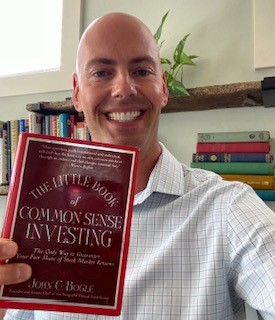
Book written by: John C. Bogle
John Bogle has written several books, but this one gets right to the point. John Bogle invented the index fund and in this book he makes a strong case for index investing.
In 1975 John Bogle invented the first index fund, which was a single investment that invested in the entire S&P 500 as its “index”. The index fund was different from other actively managed funds because it doesn’t need to pay managers to make trade decisions and had a significantly lower fee. This was a big step forward for investors who simply wanted to own a slice of the market without paying a manager a big fee to manage the stocks in the fund.
It is also important to recognize John Bogle is also the founder of The Vanguard Group. The Vanguard Group was uniquely founded as a “co-op” sort of organization rather than a corporation. Basically, it is owned by and owes duty to its customers rather than a group of investors splitting the profits.
John Bogle looks at many facets of long-term index investing through this book and uses actively managed funds as his comparison. He makes case after case for the utility of using index funds for long-term investing.
One concept I enjoyed, which was well articulated was; to beat the market in the short-term (for example, to do better than the S&P 500) you have to do better than someone else. There is always a winner and a loser in short-term trading, contrarily in long-term investing the underlying business should earn profits to make all owners a “winner”. This means all active managers of mutual funds are essentially in competition with each other. It is a statistical rule that half of them will beat the average and half will be below average. Bogle looks at it many ways, but he argues once mutual fund managers take out their fees a high majority of them are worse than the market average (S&P 500) in the longer-term.
The Little Book of Common-Sense Investing is for the investor with some knowledge of how the financial markets work. It spends a considerable amount of time discussing the advantages of passive index investing as opposed to actively managed equity funds.



